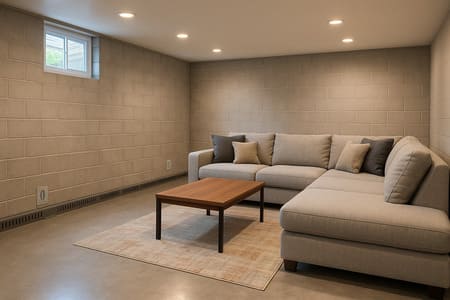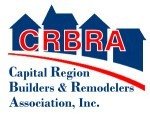Albany Basement Finishing: Why Waterproofing Comes First

Dreaming about a cozy family room, home office, or gym downstairs? In Albany, NY, finishing your basement starts with one smart move that protects everything you build next: professional basement waterproofing. Done first, it turns a damp, unpredictable space into a dry, reliable foundation for the rooms you want.
When you schedule basement waterproofing in Albany, NY, before any framing or flooring, you cut the risk of mold, warped materials, and costly tear-outs later. It also helps maintain consistent comfort through spring snowmelt, summer humidity, and fall rainstorms common across the Capital Region.
What Waterproofing Really Does For Your Finished Basement
Waterproofing is more than a pump in a pit. It is a coordinated system that captures water where it appears, moves it away from your living area, and manages moisture in the air. That means cleaner air, stable finishes, and fewer surprises when storms roll through Albany, Colonie, and Guilderland.
The payoff shows up over time. Floors stay flat, walls remain spotless, and the space feels like the rest of your home rather than an afterthought below grade.
Common Albany Moisture Sources That Ruin Finishes
Homes around neighborhoods like Pine Hills, Center Square, and Delmar deal with changing weather, clay-heavy soils in some pockets, and older foundations. Those conditions can feed moisture issues that quietly damage new finishes. Watch for patterns like these:
- Thin, salty streaks on walls called efflorescence signal water moving through masonry.
- Short, sharp storms that push water toward foundation walls and into floor-wall joints.
- Spring thaw that raises groundwater and overwhelms undersized or aging pumps.
- Summer humidity that condenses on cool basement surfaces, leading to musty odors.
If these warning signs are present, do not start framing, flooring, or drywall until the water pathway is controlled.
The Right Sequence: Why Waterproofing Comes Before Finishing
Finishing first can trap moisture behind walls, where you cannot see small problems turning into big ones. Waterproofing first sets a clean baseline so you can confidently choose insulation, wall systems, and flooring made to perform in below-grade spaces. It also lets you route discharge lines and electrical for pumps before any walls go up, which keeps your future living space neat and quiet.
Think of it like building a house, roof-first. Without the roof, every upgrade inside sits at risk. Basement waterproofing is that protective roof for the rooms you are about to create below grade.
What A Complete Waterproofing System Includes
While every home is different, most reliable systems share several parts that work together. Your exact setup varies by foundation type, age, and how water enters the space.
- Interior perimeter drainage that guides water to a sealed sump basin.
- A quality sump pump sized for local storm patterns, with a check valve and proper discharge routing away from the home.
- Backup protection for outages, such as a battery system that keeps water moving during heavy summer thunderstorms.
- Wall moisture management, often with vapor barriers or waterproof panels designed for finishing.
- Humidity control that keeps air balanced so surfaces stay dry and comfortable.
A single dehumidifier or a lone pump is not a full solution if water is entering through multiple paths.
Materials That Perform Better After Waterproofing
Once water is managed, you can choose finishes built for longevity. Moisture-smart materials help the space feel like an upstairs room while standing up to Albany's seasons.
For walls, consider systems designed for basements that manage vapor, pair with insulation correctly, and resist mold growth. On floors, many homeowners choose rigid core or tile options that sit over proper underlayments made for below-grade use. Ceiling choices range from drywall with access points for valves to finished grid systems that allow quick maintenance without damage.
The goal is not to make a basement act like an upstairs room, but to select finishes that thrive in a below-grade environment.
Local Factors We Consider In Albany, NY
Albany's freeze-thaw cycles, sudden downpours, and humid summers test basement systems. Older limestone and block foundations in areas like Buckingham Lake and Helderberg behave differently than newer poured concrete in parts of Colonie or Niskayuna. That is why a professional assessment looks at the age of your home, grade, gutters, and any previous patchwork before recommending a plan.
During spring snowmelt and heavy summer storms, power flickers can stop standard pumps. A battery backup and a high-water alarm add valuable time to protect finishes while you are at work or away for the weekend.
How A Local Remodeling Contractor Coordinates The Work
As an Albany remodeling contractor, F. R. Kennedy and Son Construction evaluates moisture patterns before design. We identify where water shows up, size the sump and drainage appropriately, then plan utilities and layout around the system. That coordination keeps mechanicals accessible and out of sight while protecting the living areas you are investing in.
If you are just starting to plan, talk with a local Albany remodeling contractor early, especially if your home sits on a slope or you have seen damp corners during storms. That initial step saves time and helps avoid design changes later.
Signs You Should Waterproof Before You Finish
Even small clues can predict future problems behind new walls. Before ordering materials, walk through this quick check:
- Musty odor or allergy flare-ups after rain.
- Peeling paint, bubbling coatings, or white crust on block walls.
- Dark lines where the floor meets the wall.
- An old pump that runs often, sounds loud, or cycles for long periods.
- Past water marks on wood framing or stair stringers.
If you see any of these, get an assessment and a waterproofing plan in place first.
Why Finishing Without Waterproofing Costs More Later
Hidden moisture does not stay hidden. It can swell trim, loosen flooring, and stain paint in ways that are hard to fix without opening walls. Replacing finishes is almost always more disruptive than addressing water pathways while the space is still open. With waterproofing first, you protect your budget, schedule, and peace of mind.
Comfort, Air Quality, And Long-Term Value
A dry basement feels better and smells better. It helps protect the rest of the house from musty air that can drift upward. When you sell, clear documentation of a professional system can reassure buyers that your finished basement was built on a dry, managed foundation.
When To Schedule Waterproofing In The Capital Region
Homeowners often plan finishing in late winter or early spring. That timing can work, but crews are busiest around thaw and heavy rain. If your schedule allows, booking ahead for late summer or early fall may provide smoother timelines. Regardless of season, the sequence stays the same: waterproof first, then build.
Our Simple Path To A Dry, Finish-Ready Basement
Here is how F. R. Kennedy and Son Construction guides Albany homeowners from damp to done:
- Assess the basement, review any past water events, and map entry points.
- Design a system that manages water and humidity with the right capacity.
- Install drainage, sump, discharge, and protection features with finishing in mind.
- Confirm dryness and air balance so your new rooms stay comfortable.
- Begin framing, electrical, and finishes over a dry, protected foundation.
If you are already designing a layout, there is still time to add protection. Ask us to evaluate your plan so that mechanicals and finishes work together.
Ready To Finish Your Basement The Right Way
Before you frame a single wall, make sure the space is protected for the long haul. Learn how a complete system shields your investment with professional basement waterproofing tailored to Albany homes.
Start your basement the smart way with F. R. Kennedy and Son Construction. Call us today at 518-729-4044 to schedule your assessment.
If you are looking for a bathroom remodeling contractor in the Albany area, please call us today at 518-432-9298 or complete our online request form.
|




